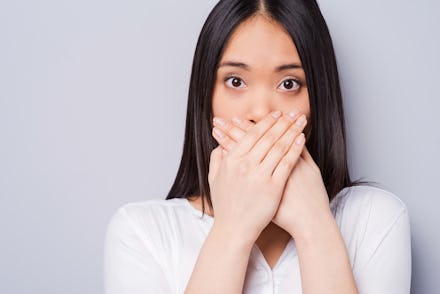If You Care About Mental Illness, It's Time to Stop Saying "Crazy" and "Insane"

There are plenty of English words that might adequately describe the current state of U.S. politics: "sensational," perhaps, or unbelievable, or absurd.
Instead, on its new magazine cover, the Atlantic opted for "insane."
If you're upset about it, you have a right to be.
It's not just one magazine cover. Words like "crazy" and "insane" flow freely in contemporary English — from Kanye West lyrics to popular fitness products.
You may have casually used the words to describe a rollicking party, an unexpected weather
But here's what you might not realize: Using "crazy" or "insane" in everyday speech — be it as a throwaway adjective or an insult — can be hurtful to people who live with mental illness. It's the same reason you wouldn't use "retarded" as a synonym for "ridiculous."
People with mental illness are your family members, friends, co-workers and neighbors. At any given time, millions of Americans are living with anxiety, depression, bipolar disorder and schizophrenia, according to the National Alliance on Mental Illness. One in 5 U.S. adults experiences mental illness in a given year, and 1 in 25 experiences a "serious mental illness" — one that "substantially interferes with or limits one or more major life activities."
"Using that kind of language sends the message that it's OK to trivialize mental illness and lazily substitute real people's lived experiences for 'wild,' 'silly,' 'dangerous' or 'out of control,'" Lydia X. Z. Brown, an activist, writer and speaker focused on disability justice, said in an email.
"For people able to change their everyday language, becoming conscious of how often they use ableist words like 'crazy' or 'insane' is one small way of reducing the stigmatizing effects of casually ableist expressions," Brown said.
Here's what to say instead: The English language contains plenty of great, descriptive words that don't trivialize or stigmatize mental illness. In fact, choosing a more precise word or phrase — instead of using a filler word like "crazy" — makes your language more accurate and powerful.
Instead of saying that Game of Thrones battle was "insane," perhaps go for "violent," "terrifying" or "thrilling." Instead of saying your roommate is being "crazy," give a more specific description: "My roommate let her cat poop on my bed and didn't bother cleaning it up."
If you need help expanding your vocabulary, Brown has a helpful glossary of ableist words and their alternatives on their blog.
"Using that kind of language sends the message that it's OK to trivialize mental illness." — Lydia X. Z. Brown
Science backs it up: Research has shown that subtle discrimination can hurt people's self esteem. This 2005 study — though not about ableism — asked lesbian, gay and bisexual individuals to read scenarios of straight people "saying or assuming things potentially offensive to gay [men] or lesbian women." Examples included saying "butch" to describe a woman with short hair and no makeup, or saying "gay" to describe someone perceived as unintelligent. For each, the participants recorded the extent to which they'd be offended and less open about their sexuality, among other criteria.
"Not only did respondents find the scenarios to be offensive and indicative of prejudice, but perceived offensiveness was associated with a decreased likelihood of coming out," the researchers found.
But as Brown pointed out, changing common speech is just a start. "We can't focus all our attention on language and say that that will solve ableism," they said.
Read more: